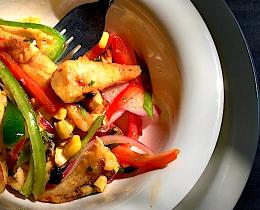The inward-turning season of winter is ideal for nourishing our inner fire, or agni.
The early part of winter follows the path of autumn, in which vata and kapha doshas (or subtle energies) are predominant, so the cold and dry qualities of vata are present in the body and the environment. The latter part of winter initiates the cold and damp qualities of kapha.
Winter, therefore, becomes a delicate balance between these two doshas, requiring that we pay close attention to our environments—inner and outer—to keep our inner fire from growing dim or wavering.
The gunas, or qualities, of winter that we seek to balance are:
• Cold with warmth
• Heaviness with lightness of spirit
• Static energy with circulation
• Dullness with inspiration
• Excess dampness with dryness
When these qualities are balanced, the winter season can be nourishing and fortifying. When out of balance, kapha qualities accumulate within body and mind, creating heaviness of spirit, weight gain, poor digestion, depression, lethargy, and weakness in the immune system that leads to colds and flus.
These can all be exacerbated by diminished digestive fire. Winter is the time to build and restore. Just as nature draws inward to rest and renew, so too should we.
Our bodies respond physiologically to cold weather by drawing our inner fire, agni, deep inside to protect the vital organs. We absorb nourishing ojas, the moist lunar energy, and agni is the “cook” that rebuilds and replenishes the body from the inside out.
Use this quiet, dark, reflective time to nourish your fire.
8 Ayurvedic Diet Tips
1. To build ojas and strength, favor ghee; warm, wholesome organic milk or almond milk; nourishing grains; and rich, warm, cooked foods. This is not the season to detox or lose weight but rather to rebuild and strengthen. Your body will actually want to gain or maintain your current weight at this time.
2. Favor sweet, salty, and sour foods.
3. Spices to favor: ginger, black pepper, pippali, cardamom, cinnamon, ajwan, cloves, licorice.
4. Honey is the best winter sweetener because it is heating and pacifies kapha.
5. For a kapha tea, add fresh-grated ginger and honey to your favorite tea. Tulsi-ginger tea is another good hot drink that strengthens the pulmonary system. Ginger plus cinnamon is another favorite combination.
6. Because the sun sets earlier now, it is best to eat your last meal of the day earlier. Avoid eating later than an hour after sunset.
7. Some favorite winter foods are yams, winter squash, cabbage, pumpkin, beets, brussels sprouts, chilies, garlic, and tomatoes. For fruits, cooked apples, bananas, dates, and figs are great. Eat tangerines for sour and sweet tastes. Good winter grains are amaranth, oats, rice, and wheat.
8. The best herbs for controlling kapha in the winter season are punarnava, kutki, and triphala guggulu.



